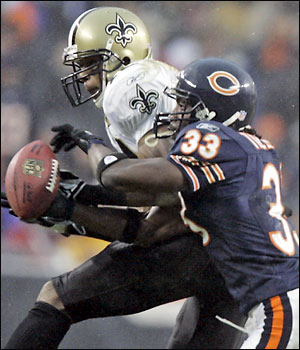
I spent the summer of 2006 on the Gulf Coast
shooting a documentary feature film. On occasion, I found
myself in and around the city of New Orleans. Although I
had seen the pictures of post-levee break mayhem on television,
I was not prepared for the 360 degrees of empty cornhusk
that represented this once bustling city.
New Orleans had always been one of my favorite places to visit. I had grown up
in Europe and something of the remaining French culture in southern Louisiana
echoed the major metropolitan areas of that continent across the Atlantic Ocean.
I remember my mother saying, “New Orleans is the most European city. If
you can’t afford a trip to Europe, go to New Orleans.” While something
in what she said was indeed true – the balconies, the courtyards, the lack
of Puritanical restraint – something about New Orleans was distinctly American
as well.
Here we saw cultures intermingle in the quintessential example of the American
melting pot, like so many ingredients in a bowl of gumbo. We saw purely American
musical forms like blues and jazz come to life and dance on the breezes of this
southeastern shore.
And, after the levees broke, we saw this
city become a kind of capital for the United States, a place
where people from Washington state to Florida could come
together, send volunteers, send money, indeed root
for. Here was our little orphan who needed help to grow up
and be a productive member of our democratic, capitalist
society.
And, in this process, the once laughing stock of NFL franchises became
the sports team of the United States. The New Orleans Saints, I heard
broadcasters announce throughout the NFL playoffs, were really the United States
Saints, and folks from Maine to California wanted them to win.
And win they did.
Americans love the come-from-behind-against-all-odds underdog tale, and the
Saints provided just that. Their long time coach Jim Haslett had ended the
2005 season 3-13. No matter how strong a talent was brought in, Haslett only
seemed to alienate and disenfranchise player after player.
August 29th, 2005, Hurricane Katrina ripped through the city weakening the
levees thus transforming much of the landscape to waterscape. Adding insult
to injury, the federal government was slow to respond leaving thousands stranded
on rooftops while tales of Superdome chaos polluted the airwaves.
Out of all this wreckage walked a head coach – perhaps a little too young
for such a position, some might speculate – Sean Payton, a Parcell's
protégé. And, in one year, not only did he take the Saints
to the playoffs, basically
finishing
third or fourth in the league, but he managed to win NFL Coach of the Year
while quarterback Drew Brees won Fedex Player of the Year and the coveted Walter
Payton Man of the Year. Two rookies, Reggie Bush and Marques Colston, were
in the running for Rookie of the Year.
When the Saints lost in the playoff game against the Bears, the game that would
have taken them to the Super Bowl, they were downtrodden and worried that they
had let down the city – and the country – those who desperately
needed them to win.
But they hadn’t let anyone down at all.
Saints fans were, of course, disappointed at first, but once they could gain
some distance and some perspective, they could see how absolutely unbelievable
it was that their team had gone that far one year after Katrina, one year with
a new head coach.
When the Saints returned to New Orleans from the Chicago game, they expected
no one. After all, their plane was four hours late. It had to be de-iced several
times. It was pouring down rain in New Orleans. And they had lost. What they
found instead was a mass of humanity lining the street from the airport. Warm,
welcoming, and thankful.
Payton commented, “The reception we received from the fans was representative
of the reception we received all season from them. We are grateful for it.
Their resolve and loyalty to the team is certainly felt in the locker room
and throughout the organization. We appreciate the way the players, coaches
and everybody on that flight that stepped off the plane and drove through the
streets of people were impressed and grateful. I want to thank the fans for
their support this season.”
Although I was not there in body. I was among that crowd lining those streets
in spirit, and I want to thank the United States Saints for one helluva football
season. Who dat say they gonna beat them Saints? Who dat? Who dat?
February 2007
|



